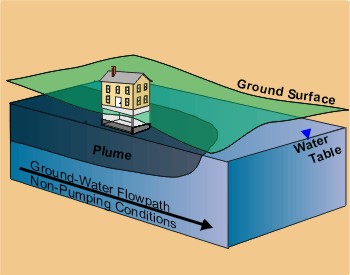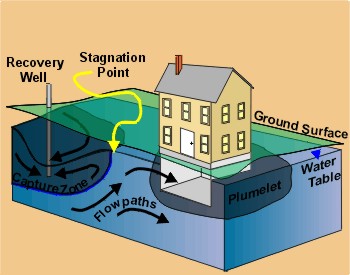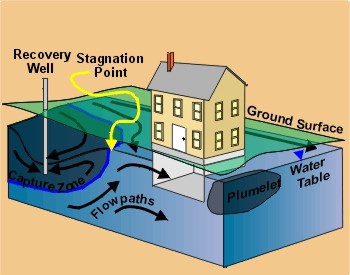
|
 |
 |
earthDr!
"the
environmental ombudsman"
Environmental Justice Plus Equity
earthDRx.org - prescriptions (Rx) for
a cleaner environment
|
|
Influencing Clean Groundwater to Flow Beneath
Your Home to Curtail Vapors in Your Basement Resulting from Off
Gassing of Seeps of Groundwater Contamination
|
Eliminating Vapors in Your Home Caused by Seepage into Your Basement of
Dissolved Phase Contamination: containing products such as gasoline, fuel
oil, MTBE, benzene, toluene, ethylbenzene, xylene, TCE, and PCE
It
has been previously noted that it is possible to split a plume into two
separate plumes. In many subsurface cleanups, but not all, there is value
in splitting a plume into two portions. When vapors result from the
off gassing of contaminated groundwater seeping into your basement, shouldn't
the objective of this type cleanup be to ensure that only clean groundwater
flows under your home? This clean groundwater will eventually flush
much of the contamination from below your home. Splitting the plume to redirect
the natural groundwater flow regime and thereby, induce clean groundwater
to flush contamination from below your home will be illustrated. A previous
figure has illustrated vapor generation in a home from the off gassing
of seepage of contaminated groundwater (such as dissolved product) into
the basement when the water table is above the basement slab.
 |
The
first figure on this page depicts an extensive plume of contaminated groundwater
engulfing this residence with the water table higher than the basement slab
so that seepage of contaminated water into the basement occurs. The plume
of contamination that is dissolved in the water table is being transported
with the groundwater as it moves from a point of higher hydraulic head to
a lower hydraulic head (generally put, but not quite correct - groundwater
and the product dissolved in it are moving from points on the water table
that have a higher elevation to those points of lower elevation - similar
to the groundwater rolling downhill). Notice that the plume of contaminated
groundwater is not that extensive across the transverse-lateral extent (width
and depth) of the plume. Just outside the perimeter defining the transverse-lateral
extent of the plume is where clean groundwater can be found. The objective
of splitting the plume into two portions is to influence, by the pumping
of groundwater, these outer flowpaths that are free of contamination to
flow under your home flushing any remaining contamination off in a downgradient
direction.
 |
The
objective of hydraulic control is to influence clean groundwater to flow
under your home. Do I need to add: that this should be accomplished in a
timely manner. Generally, this definition does not need much time to accomplish.
In the second figure, the recovery well is installed sufficiently upgradient
of the house so that the downgradient extent of the capture zone, known
as the stagnation point, is located at the upgradient side of the house.
The stagnation point should be located sufficiently close to and upgradient
of the house so that the clean ground water from just outside the sidegradient
extent and below the vertical extent of the plume is induced to flow the
shortest distance to the upgradient side of the house through those soils
contaminated by dissolved product. Once the soils on the upgradient
side and just under the upgradient side of the house are flushed of their
contaminant load, the clean ground water, which originated from just beyond
the sidegradient extent of the plume, can now flush the contaminant load
in the more distant, downgradient soils under the basement as will be depicted
next.
The second figure
depicts early capture of the plume just after the plume splitting is effectuated.
The next figure depicts a later stage of the plume splitting when the objective
of inducing clean ground water to flow beneath your home is achieved. The
objective of inducing clean ground water to flow beneath your home is to
rid those soils and waters underlying your home of contamination. Since
we are addressing
 |
remediation
of dissolved phase seeps into your basement, please remember that those
soils surrounding your home were contaminated by contact with dissolved
phase contamination, and not by contact with a separate phase which might
include such products as gasoline, MTBE, TCE, PCE, or some other toxic substance
or mixture. In other words, this discussion applies to soils contaminated
by contacting ground water that has first been contaminated by the dissolution
of product into the water and not by product directly contacting the soil.
Inducing clean ground water to flow beneath your home may not be the best
remedy if the soils proximate to your house have been contaminated by contact
with separate phase, unless these soils have been exhausted of their contaminant
load (mass) given sufficient time or some other remedial action. Dissolved
product contaminated soils (I call them solusols
- for solute contaminated soils) can be flushed with clean water to remediate
them. It may take eight or nine flushes with clean ground water to exhaust
these soils of the contamination load (mass). Separate phase contaminated
soils (I call them produsols
- for product contaminated soils) can require in excess of 400 flushes of
the pore volume to exhaust contaminants from them. Splitting a plume into
two parts can be accomplished relatively quickly when the transverse-lateral
extent of the plume is limited; the permeability of the soil to transmit
water is adequate; and, the soils surrounding your home are comtaminated
by dissolved product. When these conditions are met, splitting the plume
and flushing the plumelet beyond your basement can be measured in timeframes
of months, and not years, when the recovery well is properly installed to
locate the stagnation point of the capture zone just upgradient of the your
home.
Unfortunately,
in practice, many recovery wells have not been located in similar fashion
to that depicted in the second and the third figures. Mislocation of recovery
wells will not abate the vapor problem and possibly make it worse.
CONTINUATION
OF VAPOR REMEDIES FOR DISSOLVED PRODUCT SEEPS
VAPORS
OFF GASSING FROM SEEPS OF CONTAMINATED GROUND WATER
TREATISE
- REMEDIATION OF VAPORS RESULTING FROM PRODUCT SEEPS
TREATISE
- REMEDIATION OF VAPORS RESULTING FROM VENTING OF THE SOIL ATMOSPHERE
CONTAINING A VAPOR CLOUD
|




